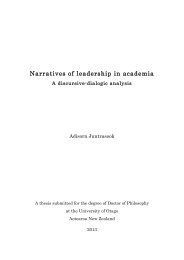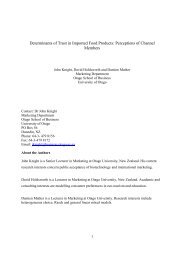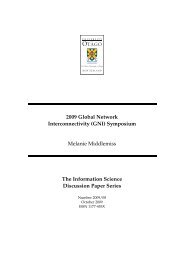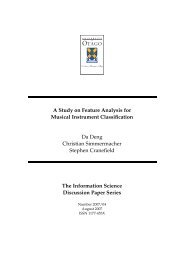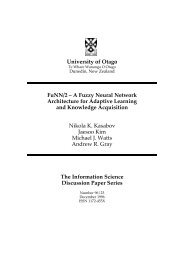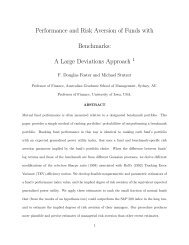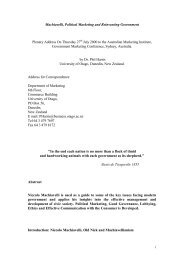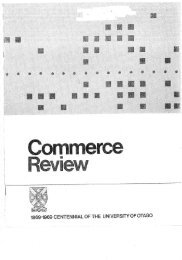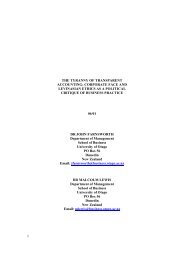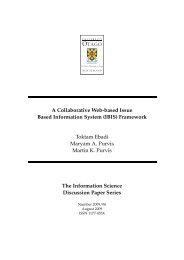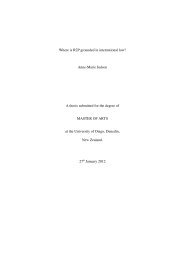University of Otago Cadastral - Otago University Research Archive
University of Otago Cadastral - Otago University Research Archive
University of Otago Cadastral - Otago University Research Archive
Create successful ePaper yourself
Turn your PDF publications into a flip-book with our unique Google optimized e-Paper software.
4.2 Facilitation <strong>of</strong> Credit<br />
Most land reform policies are occasioned by a need to improve agriculttual productivity.<br />
And among all arguments cited for land tenure reform, facilitation <strong>of</strong> agricultural<br />
credit is<br />
the most common. T h eargument is that having private titles will help farmers develop<br />
their holdings by giving them something to mortgage<br />
as collateral for l o a n s [Shipton <br />
l988, 119-20). Field research in Kenya, where this policy was <strong>of</strong>ficially pursued, shows<br />
that farmers still refuse, o nprinciple or on economic calculation, to entertain the notion <strong>of</strong><br />
land m o r t g a[Shipton g e s 1988, 1201. While European cultures have well-developed credit<br />
institutions and citizens are encouraged to borrow to establish credit-worthiness from<br />
proper management <strong>of</strong> borrowed funds and regular repayments, African cultures frown on<br />
excessive borrowing because in some cultures, a m a n spersonal debts are inherited by his<br />
children: T h eduty to repay those debts not settled by the executors passes to all those<br />
who inherit property from the d e c e a s e[Lloyd d 1962, 2871. It is therefore frowned upon<br />
for one to incur debts which will outlive them.<br />
Moreover, interests in land being communally owned, a debt properly<br />
tied to the land<br />
would be the responsibility <strong>of</strong> all the members <strong>of</strong> the land owning group. Such loan has to<br />
be used in such a<br />
way as to benefit all members <strong>of</strong> the group. Though the living members<br />
<strong>of</strong> a land owning group have the right to exploit<br />
outright, the rights <strong>of</strong> the unborn are still respected<br />
something they<br />
own with another without the o t h e r permission.<br />
s<br />
the land and sometimes to alienate it<br />
and one would not tie a debt to<br />
The possibility <strong>of</strong> a cultural cost involved in this push for a culture <strong>of</strong> land-secured credit is<br />
the high possibility <strong>of</strong> loss <strong>of</strong> the land. Shipton observed that much <strong>of</strong> the agricultural<br />
credit given against land collateral has been used for non-agricultural purposes. Notonly<br />
are these purposes non-agricultural, they are nonproductiveand therefore cannot service the<br />
debts. Some <strong>of</strong> the uses for which the loans are commonly put include paying c h i l d r e n s<br />
school fees, financing a marriageceremony, building a residential (not rent-yielding) home,<br />
securing expensive medical treatment and buying<br />
a new car. The result is an everworsening<br />
debt crisis, creating, rather than alleviating, poverty. The flip<br />
side <strong>of</strong> the<br />
mortgage doctrine is the possibility <strong>of</strong> foreclosure on failure to repay the debt. In the event<br />
<strong>of</strong> a foreclosure, it is not only the borrower <strong>of</strong> the land, but also the various relatives, living<br />
and yet-unbom, who will be deprived <strong>of</strong> their various rights in the land. This possibility <strong>of</strong><br />
foreclosure also increases the likelihood <strong>of</strong> land concentration which is discussed below.<br />
13



